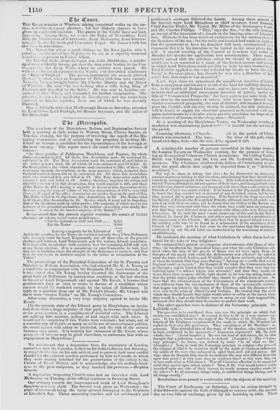A considerable number of persons assembled in the large room
of the London Tavern on Wednesday evening, for the purpose of form. ing an Evangelical Voluntary Church Association. Sir Culling Renner Smith was Chairman, and Dr. Cox und Dr. Leifebild the princi14 speakers. The Chairman attributed the failure of Christianity to pro- duce the good effects that might be expected from it: to " defective machinery "—
Nor was he alone in taking this view ; for he discovered an Mere:mat? numher of' persons looking in that direction, and thinking that they should rind a remedy in an imp:liven:ea orate ninchinerv, Hum looked at the authors ()xtind Tract soilthough he (lid not appnsve atheir views, and thought their rilms of a Clobtian church erroneous, yet he agreed with them that ft correction in the Church of Christ was much needed. If he looked at the Plymouth Brethren, he found that they seceded, not Oil account of' any doctrinal errors, but hecans they yearned for a purer cummunioe. If he turned to the huge secession of the Society of Friends, the Evangelical Friends, although doctcinal points vent mixed up with their secession, yet he fimnd that the feeling of' the Soviets wa: that they were connected with those for whom they could have no sympathy, and that they were debarred from mill union with others who were Evangelied Christians. If he took the most recent occurrence of this sort its the Kirk re Scotland, he found Dr. Chalmers and others putting forward a purification cf Ohio communion (Attie Church. lie said, then, that by general assent a remedy for existing evils was to be found in a reformation of the machinery of tie Church of Christ. And he had come to the conclusion that the machinery established by our blessed Lord was neutralized by the machinery of natio:41 establishments.
He reminded the meeting of what Christians in other flames had en- dured for the sake oh' true religion— Ile compared their present advantageous circumstances with those of other times', he recollected the Apostulicid times, and what the early Christiuns suf. fered when the fury of the priests of Rome was let loose upon them : le thought of the agony with winch the Reformation was effected : he called to mind the trials which Luther, and Wickliffe, and Knox endnred; and with one of them he trusted, that they were that dav " lighting up a candle that not all England could extinguish." He thought Of the trials the Covenanters had to go through ; mind he trusted that they would consider that they were that day entering upon " a solemn league and covenant," and that they would mat throw down their weapons till the light should be let into the strong holds, so that the public :night judge whether they should be pulled down or not. lle knew that the circumstances of' the Covenauters of the imineteeuth century were different from the circumstances of those of the seventeenth century: that league was taken in the times of the Clualeses and the Jameses—they were now in the reign. of Albert (I) and Victoria. lie trusted that the vessel which they should launch that night would arrive in safety at the haven where they would lie ; and as the facilities were so many, so was their responsibility increased that they should bind themselves to perfect their work.
'The other speeches were in defence of the Voluntary principle. Dr. Leifchild said— The question to be considered then was, was the principle on which their society was established true ? it seemed to him to lie in a very narrow com- pass. It was to be found in the reply of Dr. Wardlaw to Dr. Chahners. The friends of Dr. Chalmers complained of the mode in which Dr. Wardlaw had replied to that very able gotta:man. They complained of Dr. Wardlaw's ar- guments. This reminded him of the story of the Quaker, who, being refuted in logic, exclaimed to his opponent—" Argument, argument ! Oh, the lard rebuke thee." (Loud laughter.) Ile was not fund of definitions, for he often thought that a definition wanted to be defined. (Laugh(er.) The " Volun- tary principle," he knew, was defined by sonic "to do what we like." (Laughter.) Now, he took the Voluntary principle in religion—the power of the religion of Christ to maintain itself by the spirit of' kindness influencing
the minds of the men who embraced it, apart from civil aid and power. Rut why, when he thought this, was he to condemn the men who differed from lam upon that point ? or why were they to condemn him ? or why were they no/
to love each other as Christians ? Was all Christian affection to be suspended until they agreed upon minor points ? Now, it' Dr. Cox would have a motto
inscribed upon one side of flair banner, he would propose another motto for the other—" In all necessary things unity, in indifferent things liberty, and la all things charity."
Resolutions were passed in conformity with the objects of the meeting.


























 Previous page
Previous page